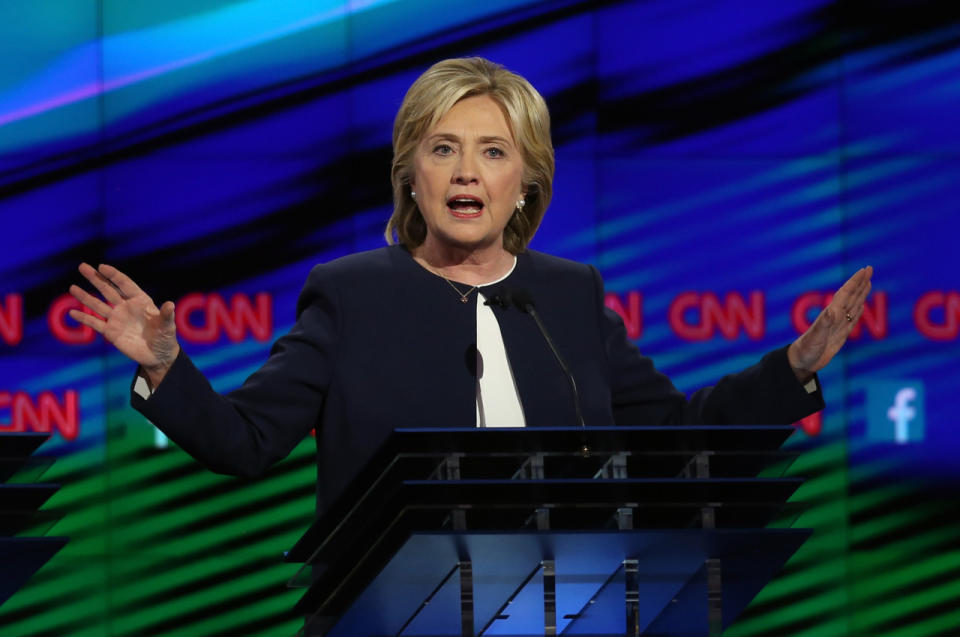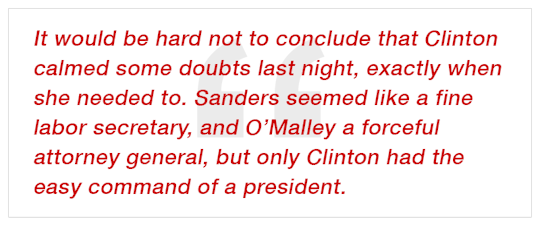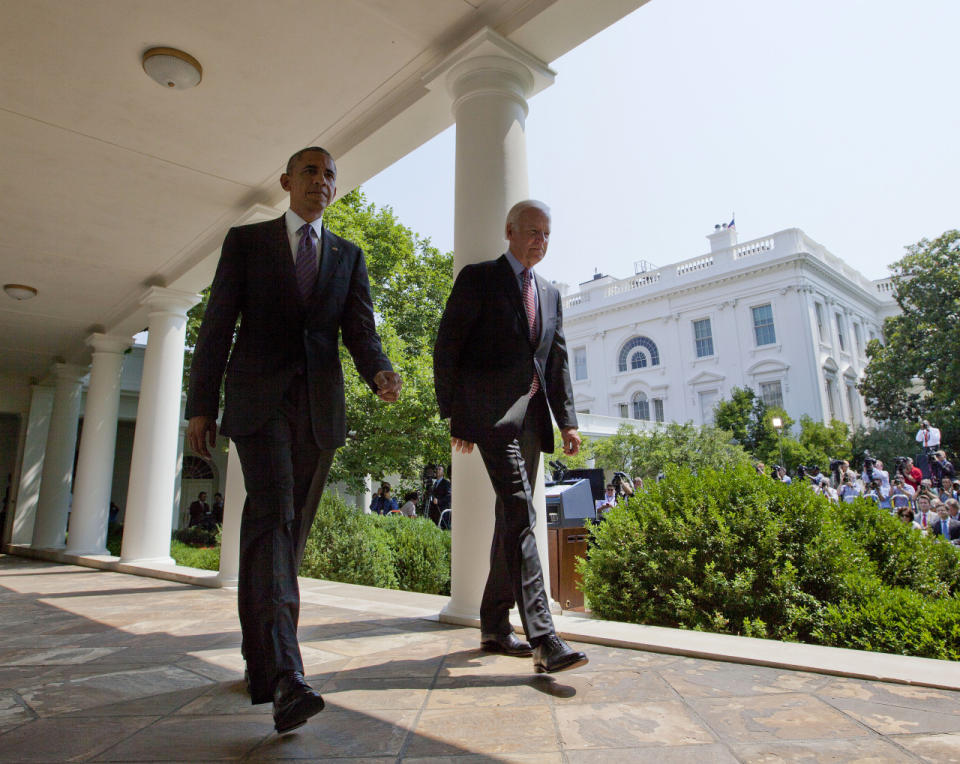A careful Clinton keeps Biden at bay
It would be interesting to hear how Bill Clinton, one of the best debaters of his generation, breaks down last night’s debate when he talks it over with his wife today. I’d like to be there when Martin O’Malley finally gets a chance to debrief with his advisers, or when Bernie Sanders returns home to find that those damn kids still won’t get off his lawn.
But the most fascinating post-debate discussion today, far and away, will be the one that happens in the West Wing, when President Obama and Joe Biden sit down for their weekly lunch.
I’m betting Hillary Clinton is pretty interested in that conversation too.
Clinton had a bunch of audiences last night. She needed to appeal to the disheartened activists who are fueling Sanders’ growing revolt in Iowa and New Hampshire. She needed to reassure Democratic voters — and a lot of her own supporters — who have started to wonder if she can inspire enough trust to win.
But she also had to be cognizant of a much smaller audience watching in Washington — namely, the president she would succeed and the vice president who lingers still on the campaign’s periphery.
Slideshow: First Democratic debate >>>
It’s no easy task, balancing that particular audience against the others. On one hand, Clinton has decided, rightly or not, that she has to put some distance between herself and Obama on issues like immigration and Wall Street reform, where Sanders’ supporters see the president as irresolute and accommodating. The most notable of these concerns is the free trade pact with a dozen Asian nations, on which Obama has staked no small part of his legacy.
Obama understands the calculus here. He gets the political realities as well as anyone, and he no doubt recalls that Republicans ran a lot further from George W. Bush in 2008 than Clinton is running from him these days.
At the same time, though, Clinton has to be careful — at least as long as Biden is weighing a run of his own — not to inflame tensions with her former colleagues at the White House.

Democratic presidential candidate Hillary Clinton makes a point at Tuesday night’s debate in Las Vegas. (Photo: Joe Raedle/Getty Images)
The trade deal, which Clinton steadfastly supported during her time in the administration, isn’t just another policy initiative to the president; he’s personally invested in it, and he was deeply stung by attacks from Democrats and labor leaders who opposed the deal even before it was reached.
That’s why, when I spoke with Obama about the trade pact in Portland, Ore., last May, he vented his frustration at Elizabeth Warren, the populist scold of the Senate, essentially calling her dishonest. Word is he’s not much happier right now with Clinton, who disowned the deal at exactly the moment when Obama was wooing Democrats in Congress.
You can see the potential peril for Clinton here. To the extent that Biden has articulated a rationale for running, it’s that someone ought to campaign on the administration’s record, of which he is enormously proud. The more Clinton seems to trash that record, the wider she opens the door.
And it must occur to both Obama and Biden that if Clinton is willing to blithely toss aside longstanding positions like her support for free trade at a time when her hold on the nomination isn’t being seriously challenged by anyone who’s actually electable, then she’s probably willing to toss aside any other accomplishment that might become something of an inconvenience.
By the time she gets to November 2016, Clinton might be railing against health care and the Iran pact too, for all we know.
To this point, Obama isn’t thought to have taken a position one way or the other on a Biden candidacy, and that’s not surprising for a president who’s never shown much enthusiasm for kingmaking inside the party. But if Clinton seemed ready to shred the Obama record in order to appease the left (or to woo general election voters), then that could presumably change.

You can imagine, in that case, Obama sitting down to lunch with Biden and saying, “You know what, Joe? Remember all that stuff I said about doing what’s best for your family and me being neutral? Yeah, well, forget that.”
That actually might push Biden into the race — which is why last night’s debate had to be handled artfully by a frontrunner who has a tendency to be less than artful.
Clinton managed this feat pretty masterfully. She had help from Anderson Cooper, who seemed to have little interest in policy specifics of any kind, and who mentioned the trade deal — remarkably, I thought — only at the outset and only in passing.
Clinton navigated the issue easily, tossing out some bland lines about how the final deal fell short of her loftier expectations as secretary of state. She offered herself up as a “progressive who actually likes to get things done” — leaving vague whether she was contrasting herself with Sanders or Obama, or maybe both.
And while Clinton articulated some specific positions that might have been seen as direct rebukes to the White House, including advocating a “no-fly zone” in Syria and standing up more firmly to Russia, she made sure to embrace the president when it came to the generalities.
She called him “a great moral leader” on race. (That statement must have jolted Jesse Jackson, who was sitting in the audience and could probably still have outdebated everyone onstage.) Her recurrent theme seemed to be that she was just like Obama, only willing to “go further” on issues like immigration and college affordability.

President Obama and Vice President Joe Biden at the White House. To this point, the president hasn’t taken a position on a potential Biden candidacy. (Photo: Pablo Martinez Monsivais/AP)
When asked directly how her own presidency would differ from Obama’s, Clinton replied, “Being the first woman president would be quite a change from the presidents we’ve had to this point, including President Obama.” Somehow she got away with that.
So where does last night’s debate performance leave Biden? When he sits down with Obama today, and perhaps with his family this weekend, is he more or less likely to run?
It’s impossible to know, of course, but it would be hard not to conclude that Clinton calmed some doubts last night, exactly when she needed to. Sanders seemed like a fine labor secretary, and O’Malley a forceful attorney general, but only Clinton had the easy command of a president — perhaps because only Clinton had the advantage of experience on the ultimate stage.
At the same time, though, that means that a candidate with obvious flaws — mainly a stubborn and troubling trust deficit with general election voters — finds herself positioned for the nomination with only an avowed socialist standing in her way and nothing like a true heavyweight in sight. If you’ve been in politics as long as Biden has, that has to seem like an invitation.
What we do know is that Biden has just about run out of time. Clinton’s stabilizing performance in the first debate means that he can’t wait around for another two weeks while party leaders and contributors cast about wildly for an alternative; the longer he stands on the sidelines, the more cemented Clinton’s claim on the Democratic machinery will be.
If today’s lunch at the White House offers another chance for Biden and Obama to discuss a possible candidacy, then very likely it’s the last.
(Cover tile Photos: Erik Kabik Photography/MediaPunch/IPX/AP; Andrew Harnik/AP)


